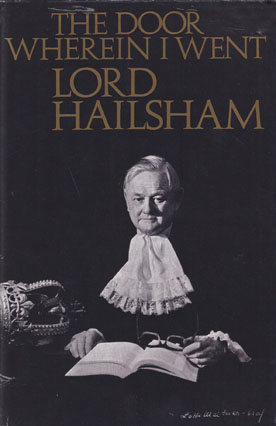
Out Of Print
In politics there is no mistaking Lord Hailsham's style. The same originality distinguishes his autobiography. Politicians who write their memoirs are as a rule concerned to defend their own record, to cut their critics and rivals down to size, and, if there is space left, to give a farewell squeeze to the hands of their supporters. No such motive animates Lord Hailsham.
What interests him, and what rapidly absorbs his reader, is what he thought and thinks and how he came to think it. His opinion of himself and of his contribution to the life of his time is incidental and secondary to his account of the life of the mind and of the spirit. Yet for this very reason this is one of the most candid, most revealing, political autobiographies ever written.
Without breaching other people's confidences, without exhibiting colleagues or public servants in compromising or grotesque attitudes, it tells the real story. The account of the leadership struggle after Harold Macmillan's resignation here given by the man who came within an ace of being Prime Minister is perhaps the most impressive instance of the absence of recrimination, self-justification or self-pity that makes this book so convincing and so refreshing.
Lord Hailsham is the only man in the front rank of English politics who is by temperament and early training a philosopher. Although as a young Fellow of All Souls he rejected philosophy in favour of law as a profession, he has never abandoned its rational, questioning approach. The principles that he has lived by as a man and stood for in public life may or may not be fashionable but they are at least coherent, consistent and clear.
That they are far from being the unexamined prejudices and attitudes of his class and his milieu this fascinating autobiography makes clear. As a schoolboy Qgintin Hogg had emancipated himself from religious belief and sternly told the Headmaster of Eton that it was nonsense to talk of the soul or survival after death. How and why he came to think differently is the central theme of a book that has the courage to be truthful about convictions, loyalties and conduct without ever embarrassing the reader.
But it is much more than an account, by an exceptionally gifted man, of his attempt to make sense of the world and of himself. Lord Hailsham has held the highest office open to a lawyer. He has headed the Conservative party organisation and in that capacity won the most emotional victory at a General Election since the Labour landslide of 1945.
He has been Leader of the House in both the Commons and the Lords. He has twice been Minister of Education and as the first Minister for Science so distinguished himself as to be elected a Fellow of the Royal Society. On all these topics he has much to say and says it pithily. In his book as in his public career he is never dull or obscure.